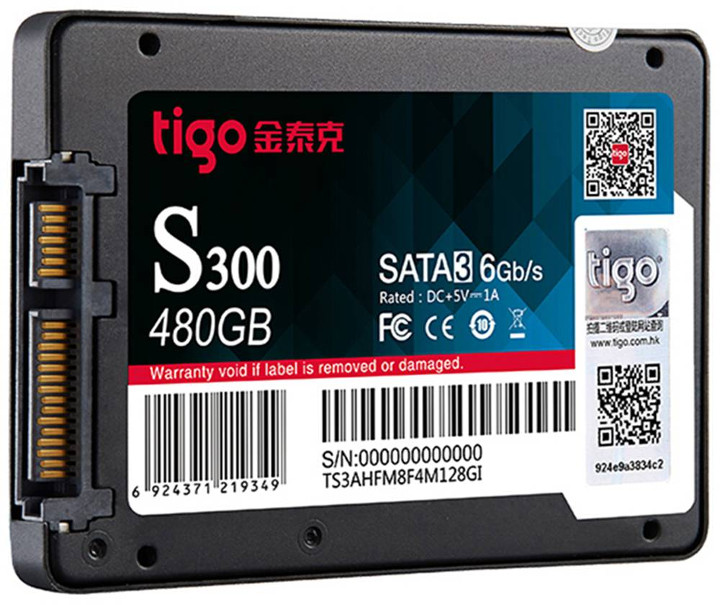I would consider purchasing a computer without SSD anymore, at least to install the operating system, and store things like email databases and web caches, since it makes a huge differences in terms of performance compared to traditional mechanical hard drives.
That extra performance comes at a cost however, as SSDs have been much more expensive than HDDs, and still are, but costs have come down a lot. If you’re looking for an SSD with a fairly large capacity, Tigo S300 might be worth considering with the 480GB SSD now offered on GeekBuying for $79.99 shipped with coupon TXHIHAZC.
Specifications listed for the device:
- Capacity – 480GB
- NAND Flash Type – TLC
- Master Controller – Marvell
- Interface – SATA 3 up to 6 Gbps
- Performance – 500MB/s read speed, 370 MB/s write speed
- Dimensions – 2.5″ model; 100 x 69.9 x 7 mm
- Weight – 50 grams
 500GB HDD’s are still much cheaper, as you’ll find them sold between $20 to $40+. I purchased the 120 GB SSD currently used in my computer for around $70 in 2014. I had not checked 2.5″ HDD & SSD pricing for a while, and it’s impressive how prices have come down.
500GB HDD’s are still much cheaper, as you’ll find them sold between $20 to $40+. I purchased the 120 GB SSD currently used in my computer for around $70 in 2014. I had not checked 2.5″ HDD & SSD pricing for a while, and it’s impressive how prices have come down.

Jean-Luc started CNX Software in 2010 as a part-time endeavor, before quitting his job as a software engineering manager, and starting to write daily news, and reviews full time later in 2011.
Support CNX Software! Donate via cryptocurrencies, become a Patron on Patreon, or purchase goods on Amazon or Aliexpress. We also use affiliate links in articles to earn commissions if you make a purchase after clicking on those links.





Related to the “Warranty void if label is removed or damaged” shown in the product picture:
https://www.ftc.gov/news-events/press-releases/2018/04/ftc-staff-warns-companies-it-illegal-condition-warranty-coverage
“Unless warrantors provide the parts or services for free or receive a waiver from the FTC, such statements generally are prohibited by the Magnuson-Moss Warranty Act”
I’ve never heard of “Tigo”, so I checked prices of known brand names (Netherlands prices): 90 euro (incl 21% VAT) for a 480 GB SSD of Intenso and Kingston. Nice prices!
i wouldnt consider kingston for any flash storage, they got cheap, slow and unreliable past the few years.
Why do people buy noname crap like Tigo, Intenso, Kingston?
There are some companies owning NAND flash fabs, build their own controllers, have in-house knowledge and assemble all this stuff to retail products which known characteristics (e.g. SMART attributes that can be interpreted in a sane way, life expectancy due to independent reviews that happened already and so on). And then there are Tigo, Intenso, Kingston and the other noname guys who buy cheap components on stock markets, assemble them and sell something with faked/unknown SMART values and soon most probably also faked capacities (‘fake flash’ already arrived at the SSD category 2 years ago with those counterfeit Samsung EVOs sold on Aliexpress and eBay).
I really don’t get why people buy SSDs from such questionable sources/vendors or even used on eBay without knowing how much the SSD in question is already worn out and how these things perform with typical use cases (random IO, low queue depths). Also what about warranty and especially warranty handling? How is it possible to not care about this?
The ‘performance’ numbers of this Tigo thing are what my 7 years old Crucial M4 offered back then. But when only sequential transfer speeds are shown but no word about IOPS then it should already be obvious that this SSD will suck at random IO especially with low queue depths (which is typical with normal use cases when the SSD is not in a data center!).
“Why do people buy noname crap like Tigo, Intenso, Kingston?”
Because they do not care if they lose their data eg e-mail messages (discussions about cat photographs and the latest news of the Kardashians) and downloaded audio files (of less than CD quality)
Why do people buy Chinese low quality products, made with the cheapest available components, and often manufactured in factories causing serious pollution?
Because they think they are getting an amazgin bargain at such an apparently low price.
Some people know the price of everything, but do not know the value of anything.
Quick search for SSDs between 480 and 512 GB capacity with at least 75k/50k random IOPS (read/write), less than 4W active and less than 0.5W idle consumption and 5 years warranty: https://geizhals.de/?cat=hdssd&asd=on&v=e&hloc=at&hloc=de&hloc=pl&hloc=uk&hloc=eu&filter=aktualisieren&sort=p&bl1_id=30&xf=1484_5%7E2028_512%7E2235_75%7E2236_50%7E2384_4%7E2385_0.5%7E252_480%7E4832_1
Easy choice: it’s either Samsung EVO 850 or 860 since 106€ from a local dealer (trouble free warranty handling), shipping/VAT included. Samsung SSDs are also known to greatly exceed their TBW ratings and retain performance over lifetime.
Somebody on G+ mentioned fake hard drives… I had never seen any, but apparently somebody made a fake 2TB Samsung 2.5″ drive with a USB flash drive. https://youtu.be/kE2BvMrwbl0?t=1m25s
Google image search for ‘fake hdd usb drive’ shows more of these nice HDD fakes. And with SSDs it’s even simpler since all you need to fake a renowned one are packaging, the sticker you put on the chips and some firmware bits. Web search for e.g. ‘counterfeit evo 850’ will reveal some details.
If people are interested in numbers, a Chinese website reviewed Tigo S300 SSD already:
http://www.inwaishe.com/thread-12096-1-1.html
It’s start with unboxing and teardown, but if you scroll down enough there are seq and random read/write numbers like the one below.
http://wx1.sinaimg.cn/large/699093edgy1fow2ys8vf0j20kc0eb75g.jpg
Random 4K IOPS with lowest queue depth (that’s what’s typical ‘home use’ is all about): 7.8k read and 24k write –> horribly low performance compared to reasonable SSD choices (Samsung, Crucial, Intel, Transcend, …)
The SSD is advertised to use a Marvell controller but what’s inside: Silicon Motion (SM2258G) instead. Who knows whether SMART readouts are real or fake? Who knows how performance will decrease over time? Who knows how large the overprovisioning area is and how wear leveling and garbage collection are implemented?
I never buy anything but enterprise grade SSDs with PLP. Examples of SSD i have in my servers: Intel S3700 400GB, S3500 300GB, Samsung PM853T 960GB, Hitachi HUSMM1680ASS200 800TB and Intel P3600 1.6TB . Even have a couple of Intel 320s yet (not yet hitting the 8MB bug though).
Of course my use cases are different than a simple laptop, but still i’d prefer these (except the SAS ones ofc) that has the right format for a laptop.
For my laptop i actually have incoming MICRON 512GB SATA SSD 1.8″ MTFDDAA512MAR.
And these cheap SSD would likely struggle heavily when getting some load.
IMO you don’t need to buy enterprise SSDs for home usage (typical desktop/mobile use cases) but at least switching on the brain should be the first step when buying any SSD.
Is there a review on Anandtech or similar sites? No? –> don’t buy.
Are TBW numbers (TB written, endurance rating) and IOPS available? No? –> don’t buy.
At least 3 years warranty and trouble free warranty handling? No? –> don’t buy.
Do specs on product page describe reality (Marvell vs. Silicon Motion)? No? –> don’t buy.
micro SD cards of about the same capacity (512GB) are not quite as cheap ($349.99) -> https://www.amazon.com/PNY-Elite-512GB-microSDXC-P-SDU512U190EL-GE/dp/B07DGT2DL5/
so the drive arrived, 10days shipping, not bad. as expected ultra cheap, quite slow, ~7k iops, fake/crippled smart, the usual. here is the benchmark result: https://imgur.com/a/NZoGW6h
hahaha. i’ve asked for getting suckered and drive delivered. it died today, i was expecting few months, not just a tiny bit over a month since arrival. just a tiny bit to NOT be covered by free-return-shipping policy of geekbuying. let’s see how well they handle bad potatoes.
2018-09-20, story continues, replacement drive has just arrived. shall i resell it to some other sucker or try to use again, decisions, decisions!
Continue to use it and document your adventure on a blog! So far numbers are impressive
– need more fast storage
– 10 days later fake storage arrived from China
– 30 days later fake storage dead
– 30 days later replacement fake storage arrived (how much charged for shipping?)
– tbc
since it failed after 1 month, i had to pay to ship it to them (~7usd). they’ve shipped new one back to me for free though. interesting twist will be further developments, on the box it claims ‘3 year replacement’. i wonder how that part would go 😉